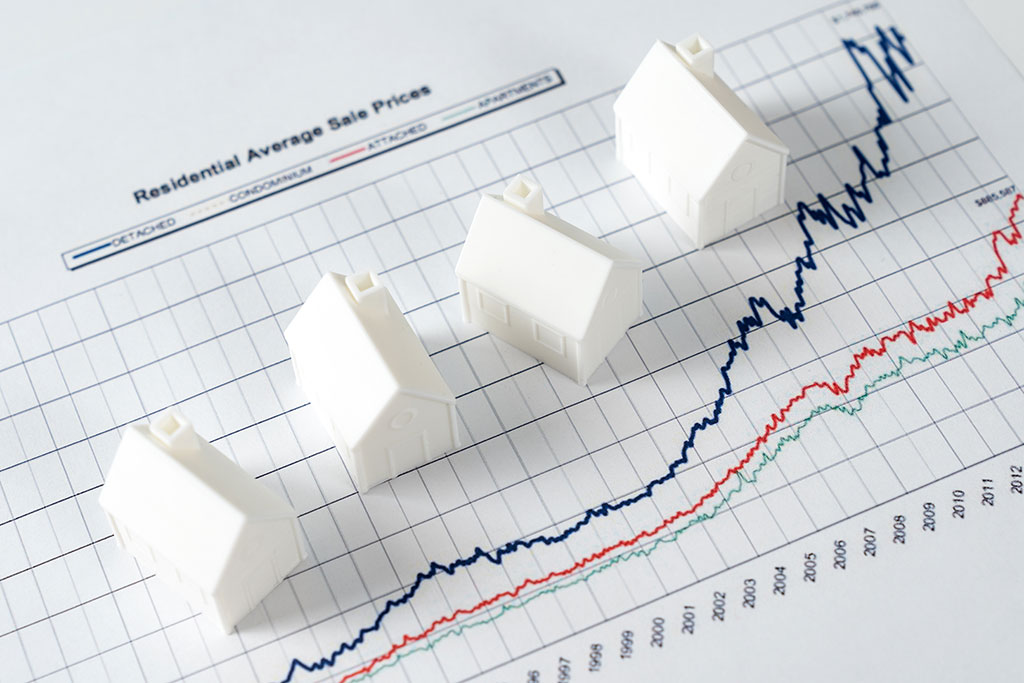As we gaze into the horizon of 2024, the Florida real estate market continues to captivate with its robust performance and the promise of new opportunities. The past year has been a testament to the resilience and dynamism of this market, with homes fetching eye-popping prices and sales volumes surging.
In September alone, the median home sale price ascended to $402,500, marking a 2.8% year-over-year increase.
This upward trajectory is not just about numbers; it reflects the enduring allure of the Sunshine State, with its idyllic landscapes, thriving communities, and vibrant economy.
Yet, as interest rates hover at 8.5%, questions loom on the horizon. Is Florida’s market still a haven for sellers? Can buyers navigate this landscape to find their dream homes without succumbing to the pressures of bidding wars and escalating prices?
This blog post seeks to unravel these queries, diving deep into the current market statistics, and peering through the lens of experts to forecast the trends of 2024.
Join us as we explore the nuances of Florida’s real estate dynamics, from the bustling streets of Miami to the serene beaches of Tampa, and uncover what the future holds for investors, homeowners, and potential buyers.
Whether you’re contemplating selling your property or embarking on a journey to find your slice of paradise in Florida, understanding these market predictions could be your compass in navigating the exciting year ahead.
Current Market Analysis: A Deep Dive into Florida’s Real Estate Statistics
In the vibrant tapestry of the Florida real estate market, a closer examination of the current statistics reveals a compelling story of growth, resilience and opportunity.
As of September, the Sunshine State has witnessed a notable increase in the median home sale price, climbing 2.8% year-over-year to $402,500. This uptick is not just a number—it’s a testament to Florida’s unwavering appeal and the solid confidence investors and homeowners alike place in its market.
The volume of homes sold has also seen an encouraging rise, with an additional 1,200 homes sold, totaling 30,815 transactions. This robust activity underscores a market that’s pulsating with demand and vibrancy.
The narrative varies intriguingly across different locales within the state, each telling its own unique story of market dynamics. Miami, a city synonymous with luxury and lifestyle, has outpaced the general market trends, with homes selling for a median price of $575,000 in September, marking a 7% increase year-over-year.
Tampa’s market, too, reflects a strong upward movement, with homes fetching a median sale price of $415,000, up 6.4% from the previous year. Remarkably, Florida stands as a bastion of positive growth, with no markets witnessing a decline in prices year-over-year.
Despite the backdrop of record-high interest rates, which have soared to 8.5%, the scarcity of inventory has led to a fiercely competitive market.
About 14.9% of homes have sold above the list price, a clear indicator of the high demand outstripping the available supply. This unique market condition presents both challenges and opportunities.
For homebuyers, it means navigating a market where strategic offers and timing could yield valuable concessions from sellers. For sellers, it’s an opportune moment to capitalize on the high prices and the competitive edge provided by listing on MLS, which can significantly increase the visibility and selling price of their homes.
The current state of Florida’s real estate market is not merely a reflection of local dynamics but stands apart from the national trend of high demand and low supply. Despite a general slowdown in 2023, Florida’s market has not only remained resilient but has shown significant growth in home sales and property prices.
This resilience is powered by a strong influx of buyers, attracted by the state’s quality of life, economic opportunities, and the prospect of investing in a market that has seen home values rise by 80% in the last five years.
As we delve deeper into the intricacies of Florida’s real estate statistics, it becomes evident that the market’s strength is not just in its current performance but in its potential for future growth.
With a keen eye on the trends and an understanding of the underlying factors driving the market, stakeholders can make informed decisions that align with their real estate goals and aspirations in this dynamic landscape.

Buyer and Seller Insights: Navigating the Florida Real Estate Market
The Florida market, with its record-high interest rates, might initially seem daunting for prospective home buyers. However, the market dynamics offer several strategies to mitigate these challenges:
- Avoiding Bidding Wars: With the market still favoring sellers due to low inventory, buyers may find themselves in competitive situations. However, by targeting properties that have been on the market for longer periods, buyers might avoid bidding wars and could potentially negotiate better terms or concessions.
- Seller Concessions: Given the high interest rates, now is an opportune time to seek seller concessions, which can help offset closing costs or buy down the mortgage rate. Sellers in markets with slower sales may be more willing to negotiate to close the deal.
- Mortgage Rate Considerations: While the 8.5% interest rate may seem steep, it’s essential to remember that mortgage rates are dynamic. Buyers should not be deterred by the current rates, as the possibility of refinancing in the future could alleviate the initial financial burden. Engaging with a mortgage advisor to understand the best timing and options for refinancing can be beneficial.
For Home Sellers:
Sellers in the Florida real estate market are positioned to leverage the ongoing demand to secure favorable sale conditions:
- Capitalizing on High Prices: With home prices continuing to rise, sellers have a golden opportunity to lock in significant gains. The competitive market, coupled with strategic listing practices such as utilizing MLS, can amplify visibility and attract more buyers, potentially driving the sale price even higher.
- Market Timing: Despite the allure of high prices, understanding the market’s timing is crucial. Listing a property when inventory levels are lower can result in quicker sales and potentially higher offers, as buyers have fewer options to choose from.
- Professional Listing Services: Utilizing platforms like Houzeo can streamline the selling process. These services not only increase the property’s exposure but also provide sellers with tools and insights to navigate the market more effectively. For instance, homes listed on MLS tend to sell faster and for a higher price, emphasizing the importance of choosing the right platform for listing the property.
Market Projections:
The current statistics and trends suggest a continuation of a seller’s market into 2024, with a strong potential for sustained high prices due to limited inventory. However, sellers returning to the market and an increase in new construction could introduce more competition, making strategic timing and presentation of listings more crucial than ever.
For buyers, the market’s evolution could bring more opportunities, especially as mortgage rates stabilize and inventory levels adjust. Staying informed about market trends, exploring various financing options, and being ready to act swiftly when the right opportunity arises will be key strategies for navigating the Florida real estate market in 2024.
The Strength of Florida’s Housing Market: A Closer Look at 2023’s Performance
The Florida real estate market demonstrated remarkable resilience and strength throughout 2023, defying broader economic uncertainties and showcasing its unique appeal.

This performance is characterized by significant growth in home values, an increase in sales activity, and a market that remains buoyant amid fluctuating mortgage rates.
Here’s a detailed exploration of the factors contributing to the robustness of Florida’s housing market in 2023 and the implications for the future.
Home Value Appreciation
One of the most striking indicators of the market’s strength is the substantial appreciation in home values across the state. In the last five years, home values in Florida surged by an impressive 80%, a testament to the enduring attractiveness of the state’s real estate.
This growth trajectory continued into 2023, with no Florida markets experiencing a year-over-year decline in prices.
Such consistent appreciation reflects both the high demand for Florida properties and the state’s successful attraction of residents and investors alike, drawn by its favorable climate, lifestyle, and economic opportunities.
Sales Volume Increase
Despite the headwinds of high mortgage rates, which climbed to 7.84% in September 2023, Florida’s housing market saw a 5% year-over-year increase in home sales.
This resilience in sales volume, even as the national market experienced slowdowns, underscores the strong demand for homes in the Sunshine State.
The increase to 30,887 homes sold in September 2023 from 29,562 in the same month the previous year highlights the market’s capacity to absorb rate increases without a significant dampening of buyer enthusiasm.
Market Dynamics
The dynamics of high demand coupled with low supply have been a defining characteristic of Florida’s market.
Even with mortgage rates reaching their highest levels in over two decades, the state’s inventory remained tight, leading to competitive market conditions where nearly 15% of homes sold above the listing price.
This scenario indicates a seller’s market, where demand outpaces supply, driving up prices and reducing the time properties spend on the market.
Regional Highlights
The strength of Florida’s real estate market is not uniform but rather varies significantly across different regions. Cities like Miami and Tampa have outperformed, with median sale prices reaching $575,000 and $415,000, respectively, in September 2023.
These areas have seen higher price appreciation rates than the state average, driven by specific local factors, including economic growth, influx of out-of-state buyers, and limited new construction keeping inventory levels low.
Looking Ahead
The robust performance of Florida’s housing market in 2023 sets a solid foundation for future growth. While challenges such as potential further interest rate hikes and economic uncertainties loom, the market’s resilience suggests a continued strong performance.
Factors such as Florida’s desirable living conditions, ongoing population growth, and a strong job market contribute to a positive outlook for the state’s real estate sector.
Florida Real Estate Market Predictions for 2024
As we look ahead to 2024, the Florida real estate market stands at a crossroads of continued growth and evolving challenges. The resilience and robust performance of 2023 lay the groundwork for a year that promises both opportunities and shifts in market dynamics.

Home Sellers Will Return to the Market
In 2024, we anticipate a significant return of sellers to the market, particularly those who had previously opted to wait out the uncertainties of 2023.
This resurgence is expected to be driven by a combination of factors, including the desire to capitalize on high home values and changes in personal circumstances, such as job relocations or the need for more space.
Additionally, the analyst Whitney, known for accurately predicting the 2008 financial crisis, forecasts that baby boomers looking to downsize will contribute to an increase in housing inventory, potentially adding up to 30 million units to the market.
Mortgage Interest Rates Will Stabilize
After reaching a peak of 7.79% in October 2023, the highest level in 23 years, mortgage interest rates are expected to stabilize in the second half of 2024. This prediction is based on a softening labor market and a slowing economy, which led to a decrease in rates to 7.35% by November 2023.
Although rates are anticipated to remain above 6%, their stabilization will likely encourage more buyers to enter the market, reassured by the prospect of more predictable monthly payments.
Rise in Home Buyer Activity
The historically high interest rates of 2023 deterred some potential buyers, leading to a cooldown in buyer activity. However, as rates begin to stabilize and with the easing of inflation, we expect to see a resurgence in home buyer interest.
The lower rates towards the end of 2023 have already sparked an increase in mortgage demand, indicating a pent-up desire among buyers to engage with the market. This renewed interest will likely drive sales volumes up, particularly as more buyers find the confidence to commit to purchases.
Continued Increase in Home Prices
Despite the influx of new listings expected in 2024, home prices in Florida are predicted to continue their upward trajectory. The state’s enduring appeal, coupled with a still-tight inventory relative to demand, will support price growth.
While the rate of increase may moderate compared to the spikes seen in recent years, buyers and sellers alike should prepare for a market where prices remain on the rise, albeit at a potentially slower pace.
New Home Construction and Sales to Rise
The share of new homes in the total sales mix reached a high in 2023, with builders offering significant concessions to attract buyers. In 2024, we anticipate an even greater emphasis on new home sales as builders and developers respond to the ongoing demand for housing.
These new constructions are likely to feature prominently in the market, with competitive pricing and incentives designed to appeal to a broad range of buyers.
iBuyers and Market Dynamics
The landscape for iBuyers is expected to evolve in 2024. After a period of offering above-market value for homes, the trend has shifted towards more conservative offers.
As the Real Estate Companies adjust their strategies in response to market conditions and financial pressures, sellers may encounter lower offers from these entities. However, this shift also opens opportunities for traditional sales methods to regain prominence.
Negotiability of Buyer Broker Commissions
Following significant legal challenges and public scrutiny, the rigidity around buyer broker commissions is poised to change. The trend towards negotiability in these fees will likely gain momentum in 2024, offering both buyers and sellers more flexibility in transaction structures.
This shift could lead to a more competitive landscape for real estate services and potentially lower costs for consumers.
Why a Housing Market Crash in Florida is Unlikely
Absolutely, let’s delve into why a housing market crash in Florida is considered unlikely in the foreseeable future. Several robust factors underpin the resilience of the Florida real estate market, making it a bastion of stability even amidst potential economic fluctuations.

Desirability and Influx of Residents
Florida’s appeal is enduring and multifaceted, encompassing its warm climate, beautiful beaches, and vibrant cultural scene. This desirability consistently attracts new residents, including retirees, remote workers, and those drawn by its no state income tax policy.
The state has seen a significant influx of movers, with around 92,000 people moving to Florida in both 2021 and 2022. Cities like Fort Myers have emerged as some of the fastest-growing in the country, reflecting Florida’s ongoing popularity as a top destination for relocation.
Economic and Job Market Strength
Florida’s economy is robust, with a diverse industrial base that includes tourism, agriculture, aerospace, and international trade. The state’s unemployment rate stands impressively low at 2.8%, and private sector employment grew by 2.5% in September 2023, outpacing the national average.
Such economic vitality supports housing demand, as more people move to Florida for job opportunities, further anchoring the real estate market’s strength.
Sustainable Growth in Property Values
Unlike speculative bubbles, the rise in Florida’s home values over the past years has been underpinned by genuine demand and limited supply. While prices have indeed risen sharply, this growth reflects the state’s increasing desirability and the imbalance between available housing stock and buyer interest.
Additionally, the market has adapted to higher values without signs of the mass speculation that typically precedes a crash.
Resilient and Diverse Housing Market
The Florida housing market is diverse, catering to a wide range of demographics, including luxury property seekers, middle-class families, and retirees.
This diversity helps stabilize the market by spreading demand across various sectors, reducing the risk of a market-wide crash that could occur if the market were overly dependent on a single demographic or industry.
Favorable Tax Policies and Cost of Living
Florida’s tax-friendly environment, with no state income tax, is a significant draw for individuals and businesses alike. While the cost of living can vary, the state overall offers a relatively affordable lifestyle compared to other high-demand areas in the United States.
These economic incentives contribute to sustained interest in living and investing in Florida, supporting the housing market’s stability.
Adaptability to Market Changes
The Florida real estate market has shown a remarkable ability to adapt to economic and environmental challenges. Whether facing hurricanes or economic downturns, the state has demonstrated resilience, with a quick recovery in property values and continued demand post-crisis.
This adaptability suggests a market capable of weathering future storms without crashing.
Investment in Infrastructure and Community Development
Significant investments in infrastructure, including transportation and public services, alongside community development initiatives, make Florida cities more livable and appealing.
These improvements not only enhance the quality of life for residents but also attract new investments into the state, further supporting the real estate market.
Considering these factors, while no market is entirely immune to fluctuations, the likelihood of a housing market crash in Florida in the near term appears low. The state’s economic fundamentals, combined with its enduring appeal to a broad demographic, suggest a market poised for continued growth and stability.
Denice Landaeta
AuthorRelated Posts
Is the Housing Market Improving? How to know?
The housing market is complicated, and due to the pandemic, it has changed significantly. This has led people to believe that...
15 secrets for selling your home faster
Selling your home can be stressful, and for that reason we decided to make an article in which you are going to find the best...


